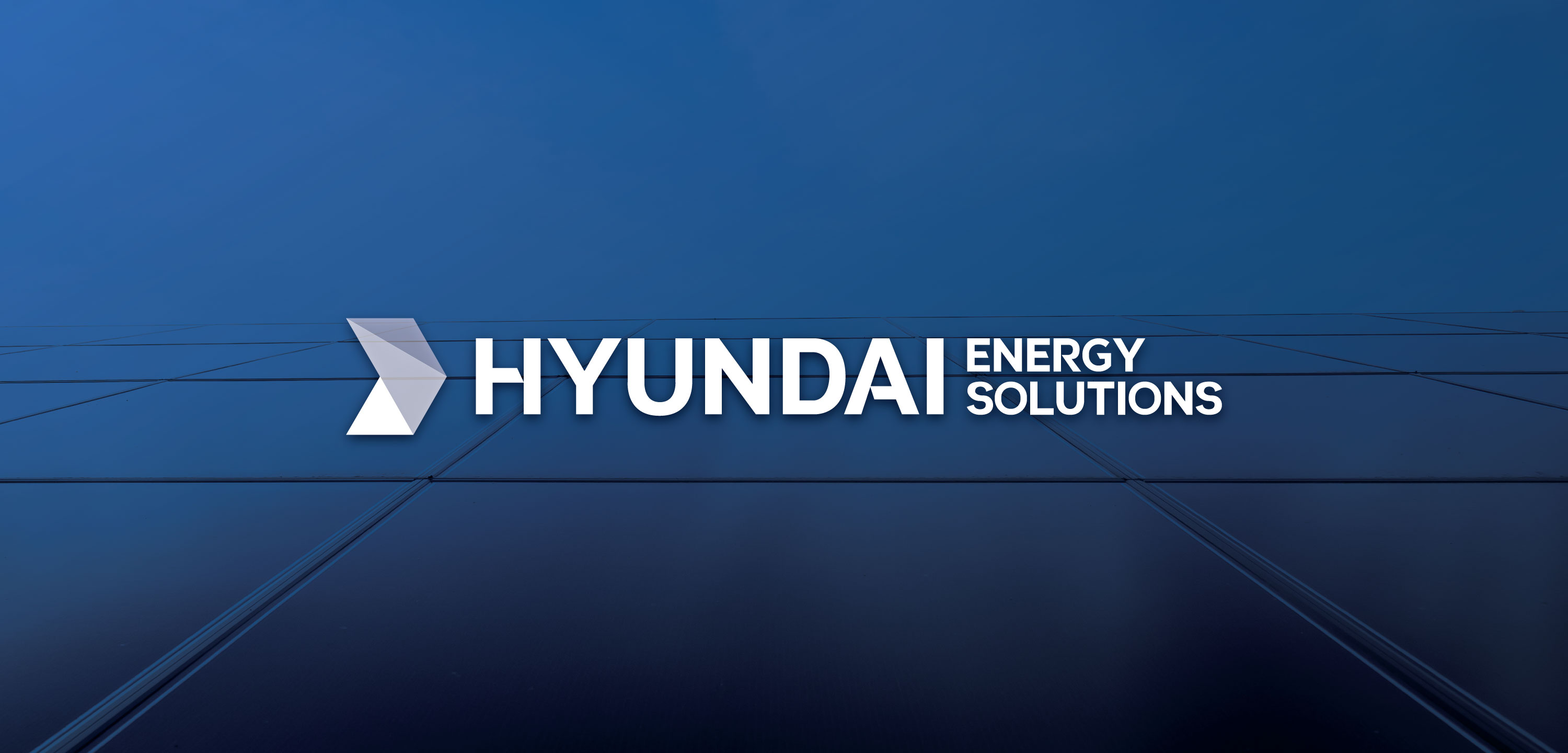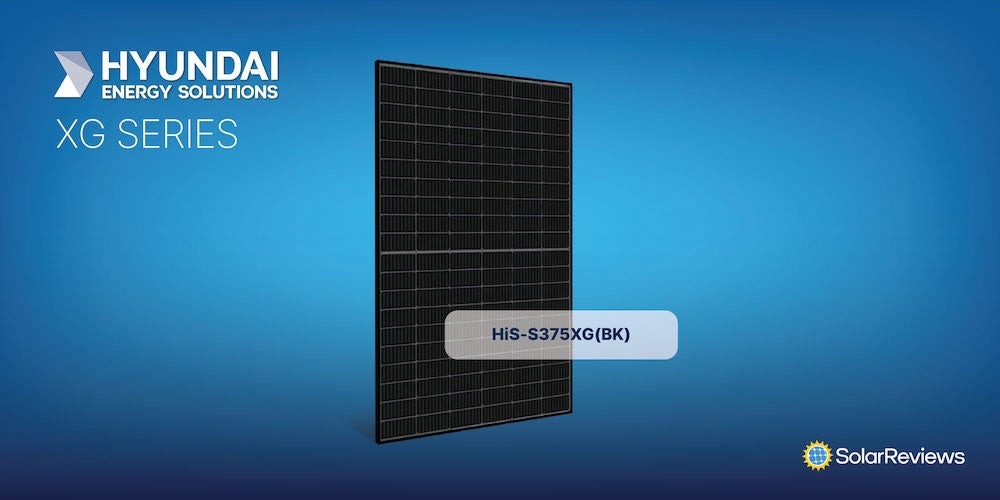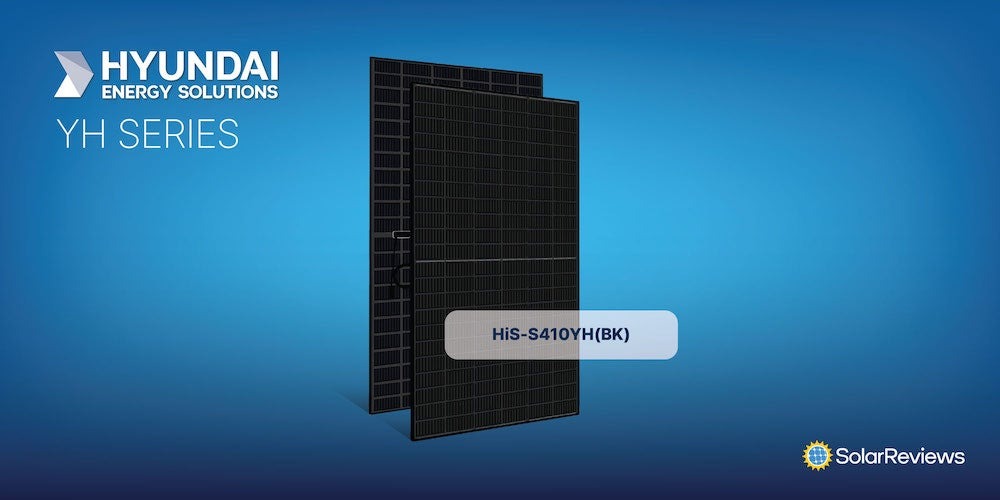
Find out what solar panels cost in your area
Hyundai Energy Solutions is a solar panel manufacturer based in South Korea. The renewable energy branch started in 2004 and has since been spun off into its own company. Since its inception, Hyundai has become a global supplier of solar panels, selling in Europe, the United States, Australia, and throughout Asia.
Hyundai tests its products in UL and VDE-accredited labs, and they build their solar panels to be salt mist corrosion-resistant, durable, and high-performing.
Our short review: Although Hyundai’s solar panels aren’t as popular as some other brands, the quality of its panels is good, and the company's strong corporate support landed them the #9 spot on SolarReviews' 2023 Top Solar Panel Manufacturers list. We have no trouble recommending them to value-minded homeowners.
Let’s take a closer look at what Hyundai offers.
Key takeaways
-
Hyundai Energy Solutions offers two lines of residential solar panels: the XG Series and the YH Series.
-
A home solar system using Hyundai solar panels could cost you between $13,300 to $19,600 after the federal solar tax credit, depending on the model and installer you use. This is right around the average cost of solar panels.
-
The XG Series is best suited for residential rooftop installations and ranges from 350 W to 375 W.
-
The YH Series panels are bifacial, making them better for residential or small commercial ground-mounted systems.
-
Hyundai solar panels come with a 25-year product warranty and a 25-year performance warranty.
What types of solar panel models does Hyundai offer?
Hyundai manufactures both commercial and residential solar panels. It currently offers two lines of solar panels: the XG Series and the YH Series.

The XG Series is made up of high-quality panels that use half-cut monocrystalline solar cells and multi-busbar technology. That’s a lot of solar jargon that basically means Hyundai is using some of the industry's best techniques to make higher-efficiency panels.
Hyundai’s XG series is between 19.2% and 20.6% efficient, which falls in line with other popular brands on the market. Power ratings for the XG Series range from 350 watts (W) to 375 W.

The YH Series is similar to the XG Series with one major difference - they’re bifacial. Bifacial solar panels are able to collect sunlight from both the front and the back of the panel. This isn’t super useful for most residential rooftop solar panel installations, as the backs of the panels won’t be able to pick up extra sunlight. But, if you’re considering a ground-mounted solution for your home, these could be a great pick.
Because the YH Series is bifacial, they have slightly higher output ratings, from 385 W to 410 W. The efficiency for the YH Series is just about the same as the XG Series, with the lowest being 19.3% and the highest being 20.5%.
How much do Hyundai solar panels cost?
An average 8-kilowatt (kW) Hyundai solar panels system can cost anywhere from $19,000 to $28,000, depending on your chosen model and installer. When you consider the federal solar tax credit, the price is closer to the $13,300 to $19,600 range. Hyundai’s pricing typically falls in line with the average cost of solar panels, which sits around $16,800 for an 8 kW system after the tax credit.
You may also see the solar panel cost written out in “dollars per watt”. This makes it easy to compare the cost of solar panels without having to worry about the size of the solar system. For Hyundai solar panels, the cost per watt is between $2.48 to $3.50 per watt. The average for solar panels in the U.S. is about $3.00 per watt.
Hyundai solar panel performance
The best way to determine if one solar panel brand is better than another is to compare metrics like its power rating, efficiency, and temperature coefficient.
Power rating and efficiency
The power rating of a solar panel is pretty straightforward - it tells you how many watts of power a solar panel will produce under specific lab conditions. The higher the wattage, the more power the panel will produce. The XG Series starts at 350 W and goes up to 375 W. Many of Hyundai’s competitors are offering panels closer to the 400 W mark. This doesn’t mean Hyundai’s panels are bad, it just means you may need one or two more of them on your roof to generate all the power you need.
Solar panel efficiency represents the percentage of sunlight that hits the solar panels that is turned into usable electricity. Most solar panels today have efficiency ratings of at least 17%, with an average of around 19%. Hyundai’s residential solar panels have efficiency ratings between 19.2% and 20.6%, which is right around average.
Temperature coefficient
The temperature coefficient measures how much the panels' power output decreases with each increasing degree in temperature. That’s right – solar panels actually produce less energy the hotter they get.
Most solar panels have a temperature coefficient between -0.3% and -0.5% per degree Celcius. This drop in panel performance is minimal, but a good temperature coefficient indicates quality manufacturing. Hyundai solar panels have a temperature coefficient of -0.347% which puts them right in the middle of the typical range.
What is Hyundai’s solar panel warranty?
Hyundai panels are covered by a 25-year product warranty that covers materials and workmanship. Most solar panel companies offer either a 10 or 12-year product warranty, putting Hyundai ahead of its competition.
Hyundai's performance warranty also has a 25-year term. After year one, the panels’ performance under Standard Test Conditions will not drop more than 2%. From years two to 25, the annual degradation rate will not exceed 0.54%. This is pretty standard for most solar panels, except the degradation rate is a little higher than most, which means Hyundai’s panels technically will degrade faster than some others on the market.
The best part about Hyundai panels is that they are backed by a huge corporate group. This means you can trust that they’ll be around to honor your warranty should anything go wrong. The peace of mind this provides greatly outweighs the slightly higher-than-average degradation rate.
Are Hyundai panels right for you?
Hyundai solar panels are a solid choice for residential solar energy systems. The cost for Hyundai solar panels depends on which model you buy, local rebates or incentives, and the cost of installations in your area.
Although Hyundai solar panels are competitive in terms of their efficiency and temperature coefficient, they have a solid warranty. Plus, being part of the Hyundai family means the company will be around for years to come to honor that warranty, should anything happen.
Your solar installer can help you decide if they make the most sense for your home based on cost, energy needs, location, roof pitch, and more.
Ana is the Marketing & Communications Manager at SolarReviews, working within the solar industry since 2020. With a Master's in Climate and Society and professional experience in marketing, she helps communicate the value of solar to homeowners and build awareness of the SolarReviews brand. On weekends you can find her at the Jersey shore, reading a book from the ever-increasing stack on her side table, or eating food someone else cooked....
Learn more about Ana Almerini